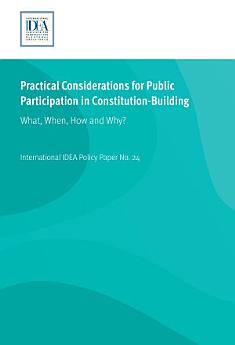Practical Considerations for Public Participation in Constitution-Building What, When, How and Why?: International IDEA Policy Paper No. 24
About this ebook
Robust participation is credited with a range of benefits—from improving individual behaviours and attitudes to democracy to shaping elite bargaining dynamics, improving constitutional content, and strengthening outcomes for democracy and peace. Yet it is not well understood whether and how public participation can achieve these ends. Much of what we think we know about participatory constitution-building remains theoretical. No two processes are alike, and there is no agreed definition of what constitutes a ‘participatory process’.
Yet national decision-makers must contend with the key question: What does a robust participation process look like for a particular country, at a particular time, in a particular context? What considerations and principles can be derived from comparative experience to guide decisions?
This Policy Paper unpacks the forms and functions of public participation across different stages of the constitution-building process and considers the ways in which public engagement can influence the dynamics of the process, including political negotiations.
About the author
Erin Colleen Houlihan is a Programme Officer with International IDEA’s ConstitutionBuilding Processes Programme. Her research and advising work focuses on democracy and conflict transitions globally. She provides technical support to in-country constitution reform programmes in a range of contexts, develops global comparative knowledge products, policy and advocacy resources, and manages tools and databases related to both constitutionbuilding processes and constitutional design. She has previously served in a variety of senior advisor roles with country-based rule of law, human rights, and democracy and governance assistance programmes, primarily in conflict-affected states. She holds a Juris Doctor and an MA in foreign affairs from the University of Virginia and an MA in special education from Loyola Marymount University.
Sumit Bisarya is the Constitutions Advisor at the United Nations Department of Peacebuilding and Political Affairs. He formerly headed International IDEA’s ConstitutionBuilding Processes Programme. At International IDEA, he oversaw global knowledge production in the field of constitution-building processes and constitutional design, as well as the provision of technical assistance to national constitution-building processes in a range of contexts around the world. Previously, he managed field operations for the International Development Law Organization. He has a BSc in neuroscience from Brown University and a Juris Doctor from Columbia Law School.
The International Institute for Democracy and Electoral Assistance (International IDEA) is an intergovernmental organization with the mission to advance democracy worldwide, as a universal human aspiration and enabler of sustainable development. We do this by supporting the building, strengthening and safeguarding of democratic political institutions and processes at all levels. Our vision is a world in which democratic processes, actors and institutions are inclusive and accountable and deliver sustainable development to all.





